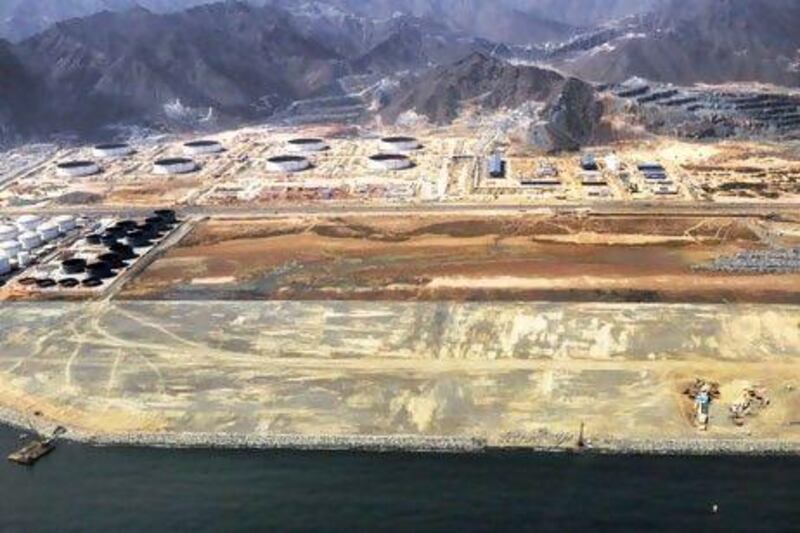Along a slim stretch of Fujairah's southern coast, workers are building concrete tanks and berths for ships so big they cannot yet enter the port. Further up the freeway, a sign proclaims: "Fujairah is growing."
Industry Insights: More premium business content offered by The National
Last Updated: May 15, 2011
Even if MSCI says no, at least people are talking about us The region's stock exchanges have a lot to think about ahead of Morgan Stanley's decision on whether to include them in its MSCI emerging markets index. Read article
Debt restructure need not be Greek tragedy for banking system European policymakers fear the worst for Greece's debt restructuring, but there is a way to restructure it without threatening the banking system. Read article
A triumph over the caste system India Dispatch: At the beginning of her life in India, the odds were against Kalpana Saroj, but she defied the unwritten rule that her entire existence was to be lived in the grinding poverty. Read article
The optimism in the UAE's most isolated emirate is sparked by an initiative by Abu Dhabi: a pipeline to funnel crude from oilfields in the west to a port in the east.
The pipeline, a project of the Abu Dhabi-owned International Petroleum Investment Company (Ipic), is to provide the capital with a faster, more secure and cheaper route for its primary export.
For Fujairah, it is set to define the emirate's economic development, turning a ship refuelling stop into one of the world's biggest oil-trading centres.
"Oil is our future," says Capt Mousa Murad, the general manager of the Port of Fujairah. "Crude oil going to Fujairah, a 200,000-barrel [a day] refinery, and more of the strategics coming from Abu Dhabi - that opened the eyes of the companies. This is the location we need to be in."
Major oil-trading companies including Vitol and Aegean have claimed the limited land available near the port, so Fujairah is shifting rock from the mountains to the shore to create land for more industrial projects, including strategic grain silos and a proposed petrochemicals plant.
Last month the Government created the Fujairah Zone for Petroleum Industry to oversee land reclamation and vet the international companies vying for a share of the trade expected when the pipeline begins operating at the start of next year.
Fujairah, which is nearly 80 per cent covered by mountains, originally made an industry of harvesting rock and making cement.
A tourism centre bloomed on the northern coast with its coral reefs and small islands. Further south, the Port of Fujairah focused on shipping containers and refuelling ships. But the emirate's story took a turn in the 1980s, when Gulf countries and the oil industry realised the narrow shipping path through which their crude had to pass could easily be blocked.
Exit points for the Strait of Hormuz, sandwiched between Iran and Oman, have in recent years become hunting grounds of pirates who have seized oil tankers worth millions of dollars.
Businessmen such as Harshavardhan Sinha, the chief executive of the Sharjah company Gulf Petrochem, saw an opportunity in Fujairah. In the 1980s, Mr Sinha began to pitch to the local government the idea of building more oil storage tanks.
"Being outside the Gulf means not being affected by issues in the Strait of Hormuz, and therefore not being affected by Iran, and therefore not being affected by the war risk," says Mr Sinha.
"There is a higher premium to be paid for insurance for those vessels. Our customers would find it more expensive to get into the Gulf as opposed to coming to Fujairah."
Now Gulf Petrochem is building tanks to store 412,000 cubic metres of refined oil products such as gasoil and the cutter stock that is blended with crude so it can be sold on the market.
That is part of the expansions that are to raise the amount of oil product storage near the Port of Fujairah from 3 million cu metres to 7.7 million cu metres by 2013, according to the port's tally.
"If we want to reach 10 million, then we have to create more land," says Capt Murad. "Investing, this is too expensive, so we do it stage by stage … if we feel there is a demand in the market, the Government creates more land and the port provides more facilities.
"This is the way we work in Fujairah: work slowly but to the demands of the market."
Fujairah has already created 2.2 million square metres of land by dumping 56 million tonnes of rock from the mountains into the sea. Some of the land is also created at the sites of the cleared mountains.
A second reclamation project finalised last month is expected to add 500,000 sq metres of land in the next two years.
On parts of the reclaimed land, the port is building two berths for large ships at a cost of Dh500 million (US$136.1m) and Ipic is building a refinery to process up to 200,000 barrels a day of crude.
Blogs: The Grid
Last Updated: May 15, 2011
Fuelling debate Read The Grid blog for the latest insight into the evolving world of energ . Read blog
Fujairah is now weighing other proposals for the new land, including another refinery, a ship-repair site and a facility to receive liquefied natural gas, which Dr Salem Khalil, the emirate's government technical adviser, predicts will eventually be necessary to fuel the planned expansions.
Dr Khalil hopes other governments in the Gulf region will also choose to pipe oil to the port.
"We hope this is the first step, exporting crude from Abu Dhabi, and we hope in the future it will be exporting other crudes through Fujairah," he says.
"Fujairah has been realised more and more to be the lung of the area … if you have a strong lung, then you can breathe, then you can run faster."





